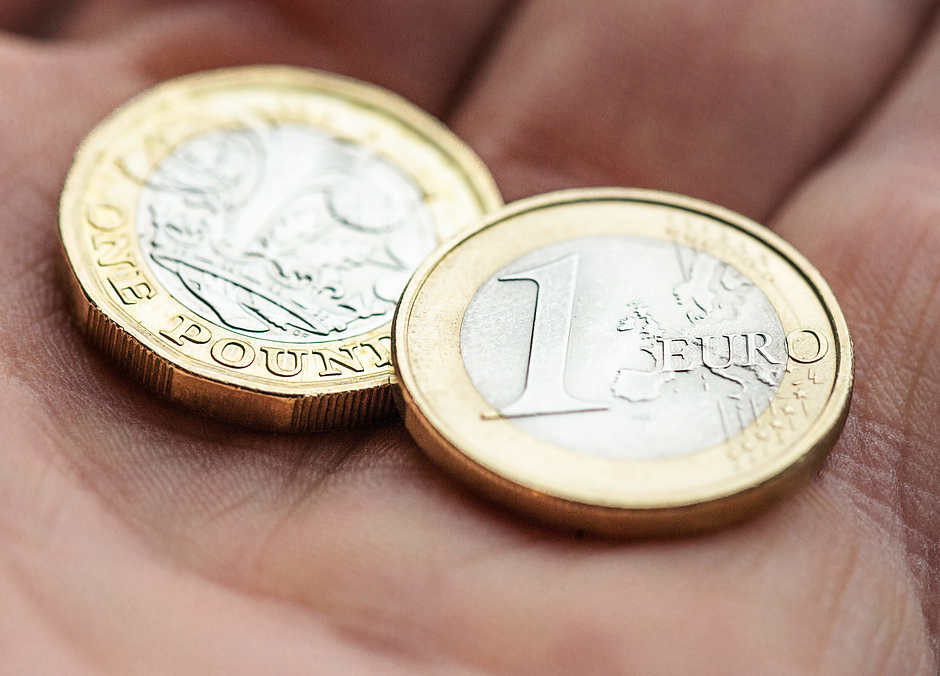Created
: 2024.09.17














![]() 2024.09.17 15:40
2024.09.17 15:40
The EUR/GBP cross remains steady around 0.8420 on Tuesday during the early European trading hours. The European Central Bank (ECB) rate cut and lower growth forecasts might further weigh on the Euro (EUR) in the near term. Investors await the UK and Eurozone August inflation data on Wednesday for fresh impetus. On Thursday, the Bank of England's (BoE) interest rate decision will be in the spotlight.
The ECB decided to reduce its key deposit rate a quarter point to 3.5% last week as inflation eases. It was the second cut, after the first move in June. ECB President stated during the press conference that the interest rate path ahead was "not pre-determined" and the central bank shall be "data dependent." On Monday, ECB Governing Council member Martins Kazaks said that the central bank will ease monetary policy further, though it shouldn't do so too hastily due to lingering inflation risks.
The release of the Eurozone Harmonized Index of Consumer Prices (HICP) on Wednesday could offer some hints about the inflation trajectory in the Eurozone and might influence the ECB about the next move. The headline and core inflation are projected to remain unchanged on a yearly basis in August. However, the hotter-than-expected outcome might prompt the ECB to slow its interest rate cut pace, which might lift the shared currency.
On the other hand, the Bank of England (BoE) is expected to hold an interest rate at 5.0% on Thursday. However, cooling wage growth might trigger the UK central bank to cut at least once more by the end of the year. "The tone of the August meeting and subsequent speeches have made it abundantly clear that officials don't want markets running away with the idea that this is going to be a rapid easing cycle," said James Smith, an economist at ING.
On Wednesday, the UK Consumer Price Index (CPI) inflation data will be released. The CPI is expected to show an increase of 2.2% YoY in August, while the core CPI is estimated to rise 3.5% in the same reported period. The softer reading could prompt the BoE to consider another cut in November.
The Bank of England (BoE) decides monetary policy for the United Kingdom. Its primary goal is to achieve 'price stability', or a steady inflation rate of 2%. Its tool for achieving this is via the adjustment of base lending rates. The BoE sets the rate at which it lends to commercial banks and banks lend to each other, determining the level of interest rates in the economy overall. This also impacts the value of the Pound Sterling (GBP).
When inflation is above the Bank of England's target it responds by raising interest rates, making it more expensive for people and businesses to access credit. This is positive for the Pound Sterling because higher interest rates make the UK a more attractive place for global investors to park their money. When inflation falls below target, it is a sign economic growth is slowing, and the BoE will consider lowering interest rates to cheapen credit in the hope businesses will borrow to invest in growth-generating projects - a negative for the Pound Sterling.
In extreme situations, the Bank of England can enact a policy called Quantitative Easing (QE). QE is the process by which the BoE substantially increases the flow of credit in a stuck financial system. QE is a last resort policy when lowering interest rates will not achieve the necessary result. The process of QE involves the BoE printing money to buy assets - usually government or AAA-rated corporate bonds - from banks and other financial institutions. QE usually results in a weaker Pound Sterling.
Quantitative tightening (QT) is the reverse of QE, enacted when the economy is strengthening and inflation starts rising. Whilst in QE the Bank of England (BoE) purchases government and corporate bonds from financial institutions to encourage them to lend; in QT, the BoE stops buying more bonds, and stops reinvesting the principal maturing on the bonds it already holds. It is usually positive for the Pound Sterling.
![]()
Created
: 2024.09.17
![]()
Last updated
: 2024.09.17

FXStreet is a forex information website, delivering market analysis and news articles 24/7.
It features a number of articles contributed by well-known analysts, in addition to the ones by its editorial team.
Founded in 2000 by Francesc Riverola, a Spanish economist, it has grown to become a world-renowned information website.
We hope you find this article useful. Any comments or suggestions will be greatly appreciated.
We are also looking for writers with extensive experience in forex and crypto to join us.
please contact us at [email protected].
Disclaimer:
All information and content provided on this website is provided for informational purposes only and is not intended to solicit any investment. Although all efforts are made in order to ensure that the information is correct, no guarantee is provided for the accuracy of any content on this website. Any decision made shall be the responsibility of the investor and Myforex does not take any responsibility whatsoever regarding the use of any information provided herein.
The content provided on this website belongs to Myforex and, where stated, the relevant licensors. All rights are reserved by Myforex and the relevant licensors, and no content of this website, whether in full or in part, shall be copied or displayed elsewhere without the explicit written permission of the relevant copyright holder. If you wish to use any part of the content provided on this website, please ensure that you contact Myforex.
Myforex uses cookies to improve the convenience and functionality of this website. This website may include cookies not only by us but also by third parties (advertisers, log analysts, etc.) for the purpose of tracking the activities of users. Cookie policy